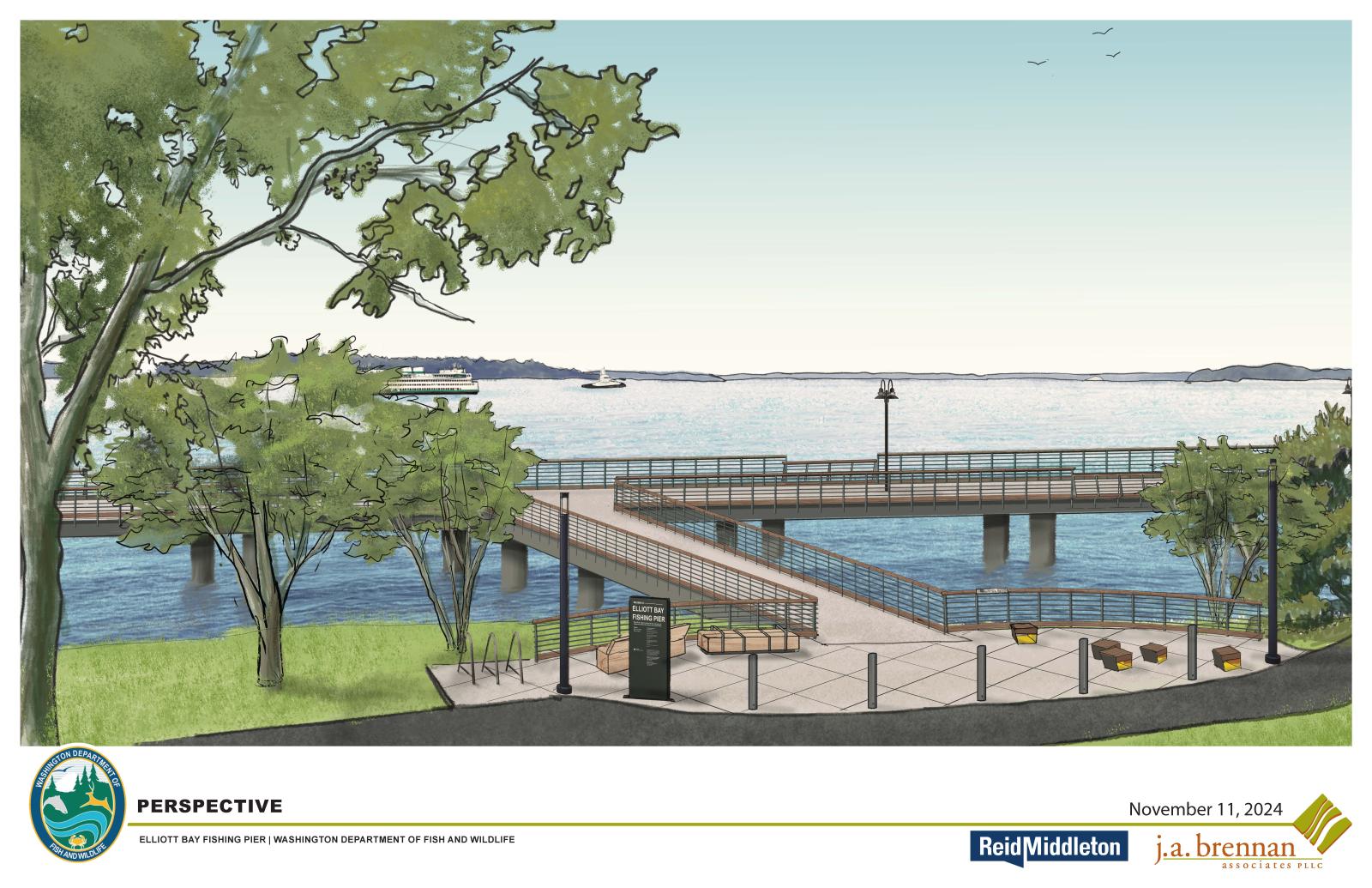Photos
Click to display full size or right-click to save to your device.
News release Nov. 13, 2024
Contacts:
Loren Brokaw, Regional Wildlife Program Manager
Peter Stoessel, Project Manager, Capital and Asset Management Program
Media contact: Chase Gunnell, 360-704-0258
SEATTLE – The Washington Department of Fish and Wildlife (WDFW) today announced plans to replace the Elliott Bay Fishing Pier with the intent to build a new pier and restore public fishing access on the Seattle Waterfront. The existing pier has been closed since 2016 due to safety concerns.
The Department is now seeking public input on the draft design for the new pier through Dec. 15, 2024. The public may submit comments through an online form. WDFW will host a public webinar with opportunity to ask questions and provide comments from 6 to 7:30 p.m. on Thursday, Dec. 5. Pre-registration is required and is available through Zoom.
The new fishing pier is proposed to be built within the footprint of the current pier to minimize environmental impacts. The project draft design packet (PDF) and a graphic rendering (PDF) of the new pier are available. Planned amenities include benches and shore power electrical outlets for squid fishing lights. More information is available on the pier webpage.
The WDFW-managed public fishing pier is located on the Seattle Waterfront adjacent to the Port of Seattle’s Centennial Park and Elliott Bay Trail north of the Pier 86 grain terminal. The current pier was built in 1980 and has been closed since 2016. Structural engineers have deemed the pier unsafe and in need of full replacement.
“For decades, the Elliott Bay Fishing Pier served as a community institution providing recreation and environmental education opportunities that link the city of Seattle with Puget Sound, from jigging for squid to casting a line for salmon or lingcod,” said WDFW’s North Puget Sound Regional Director Brendan Brokes. “After years of planning, we’re excited to release the draft design to build a new pier and restore public access at the site, and we welcome your input on the project.”
WDFW crews will be demolishing and removing benches, shelters, and other furnishings from the old pier, with work scheduled through Nov. 26. During construction, the bike lane in the area will be temporarily rerouted to the walking path for approximately 800 feet of shared lane space. The area will be cleared of equipment after 5 p.m. and on weekends. WDFW is working with the Port of Seattle and Seattle Department of Transportation to share information on this minor demolition project.
The initial draft design for the new fishing pier incorporates proposals from engineering firm Reid Middleton as well as input from WDFW staff, the Port of Seattle, and the Elliott Bay Connections project team. While the project teams are in dialogue, WDFW’s Elliott Bay Fishing Pier project is separate from Elliott Bay Connections.
Following the public input period and ongoing outreach with tribes and local partners, WDFW will seek to incorporate changes, where feasible. An updated design is expected to undergo additional State Environmental Policy Act (SEPA) and other tribal, local, state, and federal review as well as additional public input in 2025. A final design for the new pier is scheduled for late 2025.
The ongoing project to design the new Elliott Bay Fishing Pier is funded in part by a $1.715 million grant from the Washington State Department of Commerce. WDFW is requesting $15 million from the Washington State Legislature during the 2025-2027 biennium for construction of the new pier as part of the Department’s Capital Budget request.
WDFW manages more than 1 million acres of land and hundreds of water access areas throughout the state. By actively managing lands, restoring habitats, and preserving wild places, the Department serves as stewards for Washington’s natural places, protecting the state’s land and water for wildlife and people.
The Washington Department of Fish and Wildlife works to preserve, protect and perpetuate fish, wildlife and ecosystems while providing sustainable fish and wildlife recreational and commercial opportunities.
